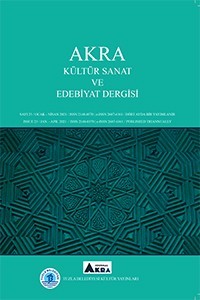Düşük Benlik Saygısı ve Varoluşsal Umutsuzluk T.S. Eliot's J. Alfred Prufrock'un Aşk Şarkısı 1919
Modernizmin insanların yaşamına çeşitli olumlu yönler getirdiğine inanılmaktadır. Bununla birlikte, toplumun derin yapısında ve bireylerin dünya algısında muazzam bir değişikliğe neden olduğu için birtakım eksikliklere de sahip olduğuna dikkat edilmelidir. Bu çalışma, T.S. Eliot'un J. Alfred Prufrock'un aşk Şarkısı şiirinin analizi yoluyla sosyal kaygı konusuna, nedenleri ve modern birey üzerindeki etkilerine ışık tutmayı amaçlamaktadır. Şiir, bireylere düşük benlik saygısı ve varoluşsal umutsuzlukla sonuçlanan modern yaşamın yalnızlık, değersizlik ve anlamsızlık duygusunu sergiliyor. Çalışma, Prufrock'un sosyal umutsuzluğunu, düşük özgüvenini ve etkisizliğini analiz etmek için ana teoriler olarak varoluşçu teoriye ek olarak Maslow'un ihtiyaçlar hiyerarşisini hümanist bir teori olarak benimsiyor. Şiir, insanların güvenliğe, sevgiye, kabullenmeye ve aidiyet duygusuna olan yetersiz ihtiyacının, insanların benlik saygısı, varoluş duygusu ve yaşama değerliliği üzerinde yıkıcı etkileri olabileceğini göstermektedir.
Anahtar Kelimeler:
sosyal kaygı, modern yaşam, anlamsız, düşük benlik saygısı, varoluşsal umutsuzluk
Low Self-Esteem and Existential Despair in T.S. Eliot’s The Love Song of J. Alfred Prufrock 1919
It is highly believed that modernism brought about various positive aspects to people’s life. However, it should be noted that it has, as well, a number of shortcomings as it caused tremendous change to the deep structure of the society and individuals’ perception of the world. The present work aims to spot light on the issue of social anxiety; its causes and effects on the modern individual through the analysis of T.S Eliot’s poem The love Song of J. Alfred Prufrock. The poem exhibits sense of loneliness, worthlessness and meaningless of modern life that results in low-self-esteem and existential despair to individuals. The work adopts Maslow’s hierarchy of needs as a humanistic theory in addition to the existentialist theory to analyse Prufrock’s social despair, low self-esteem, and ineffectiveness. The poem shows that people’s unsatisfactory need to security, love, acceptance and sense of belonging may have destructive effects on people’s self-esteem, sense of existence and worthiness of life.
Keywords:
social anxiety, modern life, meaningless, low self-esteem, existential despair,
___
- Camus, A. (1970). Lyrical and Critical Essays. Trans. by Ellen Conroy Kennedy. New York: A Vintage Books.
- Eliot, T.S. (1963). Collected Poems:1909-1962. New York: Harcourt, Brace and World Inc.
- Frankl, V. E. (1969). The will to Meaning: Foundations and Applications of Logotherapy. New York and Cleveland: The World Publishing Co.
- Frankl, V. E. (1978). The Unheard Cry for Meaning: Psychotherapy and Humanism. New York: Simon & Schuster.
- Frankl, V. E. (1992). Man’s Search for Meaning: An Introduction to Logotherapy.4th ed. Boston: Beacon Press.
- Kierkegaard, S. (1843-1959). Either/Or, Vol. II. Trans. by Walter Lowrie. New York: Princeton University Press.
- May, R. (1953). Man's Search for Himself. New York: W. W. Norton.
- Maslow, A.H. (1943). ‘A Theory of Human Motivation’. In Psychological Review, Vol 50 (4), pp.370-396. Brookling College.
- Michelman, S. (2008). The A to Z of Existentialism, ed. Jon Woronoff. Lanham: Scarecrow Press.
- Sartre, J. P. (1956). "Existentialism is a Humanism."Trans.by Walter Kaufmann. Existen-tialism From Dostoevsky to Sartre. New York: Meridian books.
- Sartre, J. P. (1994). Being and Nothingness. Trans. by Hazel Barn. Gramercy Books.
- Segal, H. (2006). Desert Island Discs – 23 July 2006. BBC Radio 4. Retrieved: 23 Oct 2022 from the World Wide Web: https://www.bbc.co.uk/sounds/play/p0093vbf
- Stralen, H.V. (2005). Choices and Conflict: Essays on Literature and Existentialism. Brus-sels: P. I. E.-Peter Lang.
- ISSN: 2148-0370
- Yayın Aralığı: Yılda 3 Sayı
- Başlangıç: 2013
- Yayıncı: Tuzla Belediyesi
Sayıdaki Diğer Makaleler
İki Dünya Arasında Sıkışmak: Roma Katolik Kilisesi’nde Eşcinsellik Dilemması
Dülger Kızı Masalının Arketipsel Sembolizm Bağlamında Çözümlenmesi
Savaşa Eleştirel Yaklaşan Öncü Sanatçılar
Sanatta ve Savaşta Yüzyılın Tanığı: Life Magazine
Sûr-Nâme “Sultan Ahmed’in Düğün Kitabı”
Halk Baytarlığı: Malatya'nın Arguvan İlçesinin Parçikan Köyü Örneği
Bedrettin KAYHAN, Rezan KARAKAŞ
Hurmanın Sağlık Açısından Değerlendirilmesi
Bir Sanat Sosyolojisi Örneği: Sanatın Meta Yolculuğu
Düşük Benlik Saygısı ve Varoluşsal Umutsuzluk T.S. Eliot's J. Alfred Prufrock'un Aşk Şarkısı 1919
